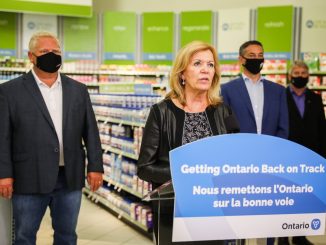
Province Unveils Plan to Reduce Transmission on Farms and in the Community
Office of the Premier
In consultation with the Chief Medical Officer of Health and local public health officials, the Ontario government is implementing a three-point plan to reduce the risk of transmission of COVID-19 on farms and throughout the community. Recent outbreaks, especially those in the agriculture and agri-food sectors, pose unique challenges that require a targeted response. By taking immediate action, health officials hope to stop the spread of the virus and move the region into Stage 2 as soon as it is safe to do so.
Details of the plan were provided today by Premier Doug Ford, Christine Elliott, Deputy Premier and Minister of Health, and Monte McNaughton, Minister of Labour, Training and Skills Development.
“We are doing everything we can to help Windsor-Essex contain this virus and get back on track, so we can allow local businesses to reopen and get more people back to work,” said Premier Ford. “Clearly, our agricultural sector in this part of the province is being hit particularly hard. Our three-point plan will give farmers the support they need to protect essential workers and ensure they can keep putting food safely on our tables.”
The three-point plan builds on the work already underway by the Windsor-Essex County Health Unit and enhances the coordinated efforts of the province, federal and local authorities. The plan’s three points are as follows:
- Ongoing and expanded on-site testing
Ontario is continuing to facilitate on-site testing at agri-food businesses and community assessment centres to make proactive testing more timely and accessible. About 350 asymptomatic workers have been tested at their work site since on-site testing launched this past weekend. Ontario is currently engaging employers to schedule more mobile testing on farms. Early identification of workers who are not showing symptoms, but who may be infected with COVID-19, will help reduce the potential spread of the virus in the workplace and the community.
- Access to Employment Benefits and Supports
Temporary foreign workers are entitled to the same benefits and protections as any other worker in Ontario. That includes workers’ compensation benefits, which are administered by the Workplace Safety and Insurance Board (WSIB). It also includes protections afforded by the Employment Standards Act. Under Ontario’s new infectious disease emergency leave provisions, a worker’s job is protected while they take unpaid leave due to COVID-19.
In certain cases, temporary foreign workers may also be eligible to apply for the Canada Emergency Response Benefit (CERB). To access the federal benefit, workers must have earned $5,000 in the last 12 months or in the previous year.
- New Public Health Guidance
The Chief Medical Officer of Health will issue new public health guidance allowing positive asymptomatic workers to continue working as long as they follow the public health measures in their workplace to minimize the risk of transmission to others. This guidance will provide clarity and assurance that local public health officials will assist with interpreting test results and developing a plan that, first and foremost, ensures essential workers in the sector are able to return to work safely and meet the business-critical operational needs on a case-by-case basis.
“By providing both farmers and employees with economic certainty, this three-point plan will allow the rapid scaling up of testing in agri-food sector workplaces across the region,” said Minister Elliott. “These targeted actions build on the collaborative and comprehensive response already in progress and will allow us to better identify and isolate cases so we can move this region into Stage 2 and safely reopen.”
“The safety of workers on farms and in greenhouses across the province is critically important as we work to overcome COVID-19,” said Ernie Hardeman, Minister of Agriculture, Food and Rural Affairs. “They work incredibly hard to support our farmers as they plant, harvest and process the good things that grow here in Ontario. It is critical that we step up our efforts at this challenging time to protect these essential workers and ensure our local produce gets to market.”
“A worker’s passport does not determine how they are treated in our system,” said Minister McNaughton. “That’s not the Ontario way. If you’re working in this province, I want you to know that your health and safety is a priority for our government.”
The Chief Medical Officer of Health and health experts will continue to closely monitor the evolving situation in all regions of the province to advise when public health restrictions can be gradually loosened or adjusted if necessary.
Although restrictions are being gradually relaxed in Stage 2, the government is strongly recommending that everyone in Ontario continue to follow public health advice, including physical distancing, wearing a face covering if physical distancing is a challenge, washing hands frequently and thoroughly, and avoiding touching your eyes, nose and mouth. If you think you have COVID-19 or have been in contact with someone who has COVID-19, get tested.
Quick Facts
- More than 170 workplace health and safety resources, including guidelines, tip sheets are available at Ontario.ca/covidsafety. They include resources translated into French and Spanish specifically for the agricultural sector.
- If an individual contracted COVID-19 while at work, they should tell their employer about their illness and any medical treatment received right away and file a claim to determine eligibility for WSIB benefits and services. Employers should report the case immediately to local public health officials and the Ministry of Labour, Training and Skills Development.
- Local mobile teams comprised of staff from local hospitals, Ontario Health West Region, Erie St. Clair Local Health Integration Network home and community care services, emergency medical services, and interpreters are being deployed each day and are completing regular health check assessments on-site at farms for all referred who are positive and symptomatic.
- There are two general assessment centres at Windsor Regional Hospital (Ouellette Campus) and Erie Shores Healthcare in Leamington. One additional assessment centre at the Nature Fresh Centre is ready to reopen should demand increase or to schedule specific times to accommodate testing for smaller farms.
- Ontario has taken action to safeguard farm workers and protect the food supply, including providing up to $15 million in the Enhanced Agri-Food Workforce Protection program.
- Stage 3 will focus on reopening more workplaces and community spaces, while carefully and gradually relaxing restrictions, and sustaining and expanding workplace health and safety guidance.
- The province has developed a practical step-by-step guide to help Ontarians as they safely develop and join a social circle.



